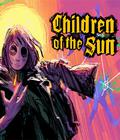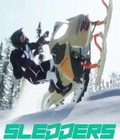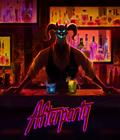The catch? The only way out of Hell is to drink Satan under the table.
As both Milo and Lola, the player will experience a neon-drenched vision of Hell for a wild, bar-hopping night. Exploring an interconnected network of underworld islands via the River Styx, players will be sucked into the lives of a variety of hellions’ storylines, each of which ripples into the next. What happens by the end of the night is completely up to the player.
WorthPlaying: What is your name, rank and occupation?
I'm Sean Krankel, and I'm the studio director at Night School.
WP: What was the concept behind Afterparty? Obviously, it's a very heavy story-based game. What was the genesis of partying in hell for the night?
SK: (laughs) It took a while for us to get to that idea, actually. We originally started wanting to do something after Oxenfree that would be more on the funny side for sure. We still wanted to do an adventure, but one day, I just came into the office, started talking to my co-founder and cousin Adam [Hines], who also wrote the game, and I was like, "You know what is underused in games, is just bars in general." You can go to the — I'm the idiot who goes into every pub in Red Dead and Skyrim and spends too long in there (chuckles), but usually, the output is just like blurry screens and stumbling animations, and so we thought it would be interesting to make a game just set in bars because you could have all these various walks of life come through them.
But we also didn't have a clear sort of goal with that. We didn't know who the antagonist could be, so we kept kind of workshopping that idea. We did kind of stumble on to the idea of drinks becoming an augment to the dialog system, so we thought that was really cool. But another time, as we were kind of prototyping and working on it, we were walking through — there's a cemetery across the street from our office (chuckles) and we're like, "What if you're drinking with dead people?" We're like, "Ooh, that seems kind of cool." And then like, "What if Satan is who you go up against?" I'm like, "Eh, that's stupid." We waited for about a week, and we're like, "I kind of like that." So we took a pretty hard pivot from what was going to be a real-world set of bars and a real-world pub crawl into this much more kind of like, Beetlejuice-y afterlife type of a vibe.
WP: You mentioned Beetlejuice, and there's a reference early in the game to the Circles of Hell from "Dante's Inferno" and even more recently, Neil Gaiman did his Lucifer interpretation of the devil as someone who parties. There are a lot of interpretations of hell and the devil out there. What are some of the inspirations that you took for your story?
SK: It's funny you should mention Dante. I mean, that is definitely a huge, huge component of it. What we decided at the very beginning was that we wanted to be inclusive of literally all religions and stories from hell and almost treat it as if every one of them were true, which allowed us to go, "Oh, now we can borrow and pick and choose and make fun of whatever we want." We get to use the appropriate stuff for the story that we wanted to tell, so really, it was not only borrowing from those classic stories but also borrowing from the reasoning for why people would go to hell, for both awful and funny reasons. Some people go to hell because they do something terrible like mass murder, but there are people down there because they sewed two pieces of cloth together, which you would go to hell for 1,000 years ago, supposedly. (chuckles) We thought that was kind of interesting.
We also borrowed from a whole variety of cultures to base our districts on. There's stuff that looks like you're in Shibuya or there's stuff that looks like you're in Amsterdam or New York. Really got to pick and choose wherever we wanted, but we wanted to primarily dodge the usual orange, fire, heavy metal, pitchfork vibe of hell. It's not because we don't like that stuff, but mostly because it's been overdone. It's really, how do we make hell a place that's fun to party in but might also have torment during the day?
WP: Going back to the drinks as a modifier to the dialog system, it looks like every time you pick up a drink, you have four different options. Are those random? Are those specific to each bar? Will they change each time you come in? How did you work that in as the third option for the dialog trees?
SK: Yeah, that took a while of testing and figuring out what the right way to implement drinking would be. In the beginning, we were trying some really weird ideas. Like, we had a pee meter for a while (laughs) and you had to balance that and go to the bathroom. You could black out, and if you blacked out, you'd get thrown out of the bar. None of that stuff was all that fun. We kept honing in on, what if the drinks were similar to when you go out, and you're like, "You know what? Tonight's a tequila night," and thinking of it more like a Harry Potter potion than anything that has too many negative, detrimental effects.
That really opened up this opportunity where then each bar does have its own themed drinks. So every bar has four to five drinks, and those drinks are unique, and yes, every single time your character speaks, you are going to get a custom choice based on that. Sometimes it's a strategic thing, like some characters you'll want to have a particular drink while you're talking to them. Other times, it's just a flavor thing, where you're like, "All right, maybe I want to flirt with this massive demon that I'm playing beer pong with to piss him off." There's a variety of reasons to use each one, but ultimately, they are very different, and they also escalate in terms of how crazy they get over the game. In the beginning, they are sort of just making you angry or funny or witty, but by the end, you can turn into a mobster or turn into a pirate or turn into a Vaudevillian comedian. There are all these drinks that wildly change how you behave, basically.
They're also somewhat detrimental to the minigames when you're playing them. With beer pong, you might have noticed that it makes the line a lot harder to focus. With the drinking/stacking game, which I don't think you got to see, but it's sort of like in "Indiana Jones," the drinking contest that Marion does. There's a whole host of those games as well, and it kind of augments how you play them as well.
WP: Out of curiosity, we saw that Milo isn't much of a drinker, at least at the beginning. Is it possible to get through the game without using the drinking options, or are those required to solve certain conversations?
SK: They are not required. The only times you're actually forced to do it is during beer pong because of course, we had to adhere to the beer pong rules. (laughs) But you don't need to make a drunk dialog choice, basically. The further you get into the game, we address some of these themes that are sort of out in the front as well. The game ultimately is this comedic adventure, but we view the drinking stuff as sort of like a tool for the player as opposed to a thing that they have to do. So no, you can get through the game without making those choices.
WP: On the flip side of that, are there any secret paths or extra bonus story paths that are opened up by drinking? Or do they just generally give you alternate interactions with the characters?
SK: It's a little bit of both. I'd say – not to put a percentage on it – but I guess maybe 75% of it is on alternate interactions that do inherently branch off into shorter chunks of conversations, and that can change your relationships that manifest in different ways on the road.
But the other quarter of them really meaningfully push things off into directions that either will change the characters that you bring with you on your journey because you start to accumulate these friends and enemies as you're playing. So even the characters you're interacting with now, depending on how you interacted with them and the success state from those quests, they may show up later, they may text you later, or they may need help later. All of that comes down to both the choices you make and sometimes the drinks that you have.
Also there are actual fail states in the activities, like the drinking games and beer pong and stuff like that. It's not necessarily the drink that you drink; it's more like the choices and your success/fail state there will wildly change how the end comes together.
WP: Is there one ending that you're shooting for, or are there multiple distinct endings to the story?
SK: There are a wild – even more than Oxenfree. Our poor writers still have bloody fingers from it. (laughs) There are a lot of different endings, and without spoiling anything, I will say that even by the middle of the game, your goal of "Get out of hell" might even change. You as the player may start to fall in love with hell – or not. I don't mean that in a mysterious way. I mean that literally, you can pick and choose how you make your way through that world. Ultimately, by the end, yeah, there's a lot more endings, and they're also not distinct endings. They are modularly pieced together, so — I can't really say any of them, but I will say that if you were to line all of them up, these permutations of how they can come together, there are probably 40 or 50 endings.
WP: We've been talking a lot about the drinking, but you briefly mentioned getting texts from other characters. One focus that we did see during the demo was the social media. How does the social media aspect play in to your adventure in hell?
SK: A few different ways. We have the equivalent of Twitter for us; it's called Bicker. In Bicker, it is a mix of a few things. It allows us to see the inner monologue of other NPCs around you. A lot of those Bicker posts that you see appearing over the characters' heads, a vast majority of them, are reacting to you and your actions. Sometimes they're bagging on you, sometimes they're praising you, but ultimately, it's a nice piece of feedback that's a running tally of what you've been doing. But they also are very quest-oriented, so you might find out that you're in a location and there's a party going on in this other district. We'd better take the River Stix over there because you see it on Bicker. So we want it to be almost like a passive version of how you would interact with actual Twitter, where it's a news feed for what's going on in the underworld, but it's also a very reactive way to make fun of you if you're doing poorly. (laughs)
WP: Do we ever find out how our two main characters died, or is that the red herring that gets the story started?
SK: It's not a red herring. We do find out. I will say that it's not the most vital component to what happens in the game. It is a mystery certainly, and it's one that you will uncover, but the themes of the game and where the game goes are really less about that, but we think it's a strong pull in, certainly. You do find out why, and it is a valid reason. (laughs)
WP: Is there anything that we haven't talked about that you wanted to mention?
SK: I hope people have fun with the game. I think it's a really wildly different game than what Oxenfree was in terms of the tone, but there's a lot of the shared DNA there. As long as people laugh, that's the biggest win for us. We want this one to feel like a serialized, binge-worthy streaming show that would be on Adult Swim, so if people are in to that, we think this is a great playable version of that. If they like things like Bill & Ted or Rick and Morty, we think they'll probably love this. We'll be out Oct. 29 on Xbox and Game Pass day and date. Also PS4, PC and Mac via the Epic Games store.
Afterparty will be available for PS4, Xbox One and PC (Epic Games Store) on October 29, 2019 for $19.99, and will also be part of Xbox Game Pass’s monthly subscription priced at $9.99.
More articles about Afterparty











 Set in Hell, Afterparty is a raucous fantasy-adventure centered around two recently deceased college grads, Milo and Lola, who are desperately trying to find a way back to Earth.
Set in Hell, Afterparty is a raucous fantasy-adventure centered around two recently deceased college grads, Milo and Lola, who are desperately trying to find a way back to Earth.